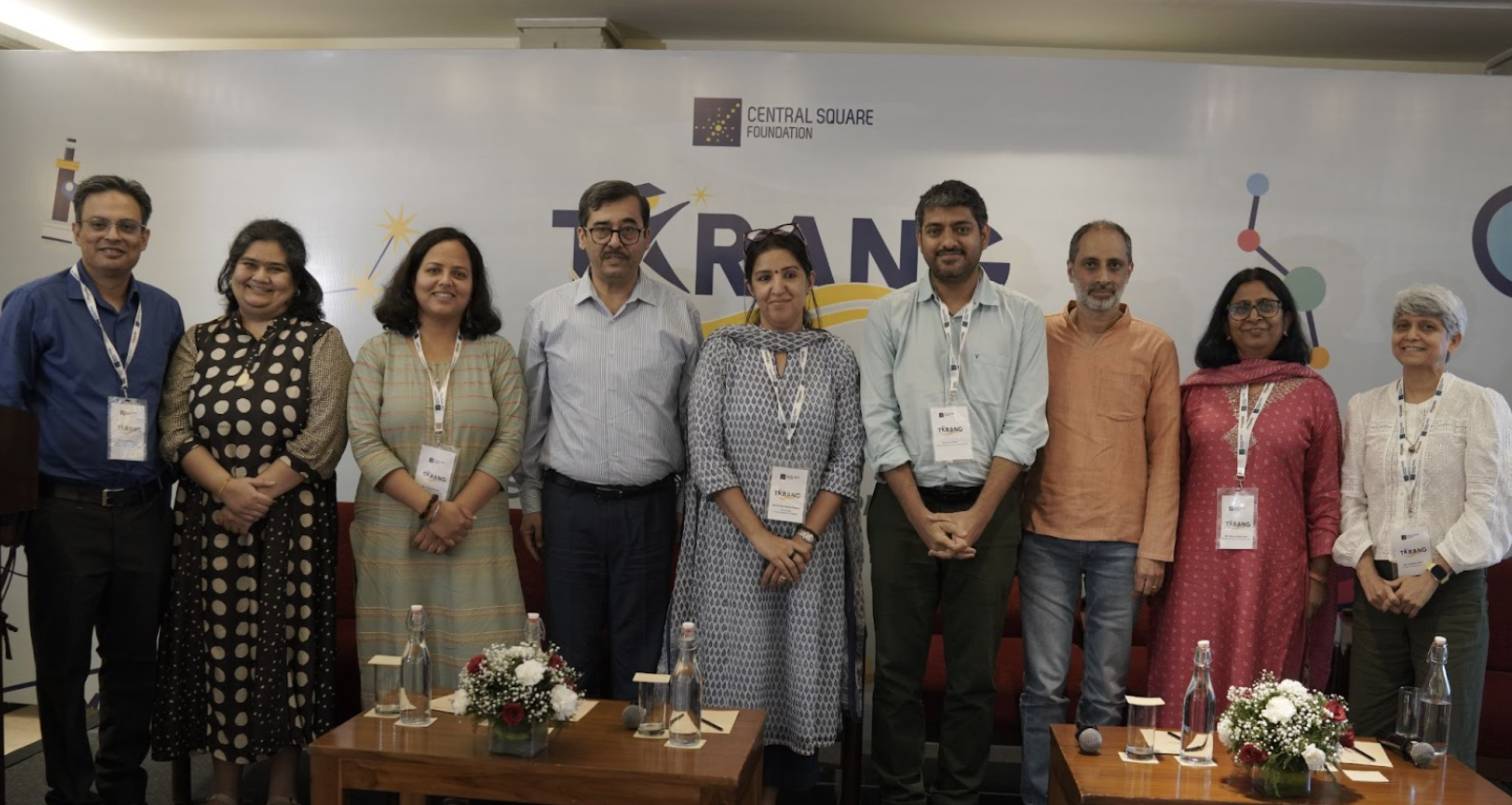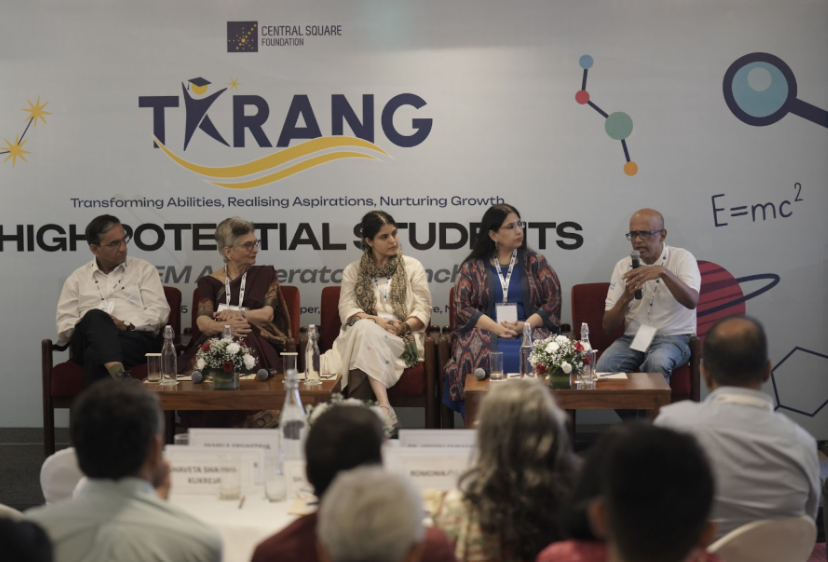 Go Back
Go BackShare
Unlocking Potential: Reimagining Support for High-Potential Students in India
By Damini Jain
Nov 20, 2025
In this blog, CSF’s Damini Jain reflects on the launch of the High Potential Students (HPS) workstream and the TARANG STEM Accelerator. She highlights how early nurturance, robust evidence-building and strong partnerships can unlock opportunities for high-potential students—particularly those from underserved backgrounds and pave the way for more equitable access to advanced STEM pathways in India.
Central Square Foundation (CSF) ushered in a new chapter in recognising and nurturing high-potential students through the launch of its High Potential Students (HPS) workstream. Academically, these students show a combination of strong ability, deep interest and creativity, and this workstream aims to strengthen the opportunity pipeline for these students towards becoming India’s changemakers. The TARANG STEM Accelerator, an initiative within the HPS workstream, took a step in this direction through its launch of pilot STEM and Life Skills interventions in five Jawahar Navodaya Vidyalayas (JNVs).
Our Vision
By 2030, we aim to transform the learning journeys of 1 lakh high-potential students, equipping them with skills, support and opportunities to excel in higher education, pursue high-growth careers and lead with impact.
Towards Inclusive Nurturance
Recognising that interventions often begin only after Grade 10, leaving much student potential untapped, CSF’s new workstream for High Potential Students aims to provide meaningful nurturance starting from middle school. The programme’s long-term vision is to build evidence for critical thematic areas for intervention, shape ecosystem supply and strengthen existing institutions across India.
The programme follows a three-pronged, evidence-driven approach to build scalable and replicable models. This includes:
Shaping Supply
- Partner with ecosystem experts to design and deliver high-quality Science, Technology, Engineering and Mathematics (STEM) and life skills nurturance programmes starting as early as Grade 7.
Strengthening Institutions
- Align with the National Education Policy (NEP) 2020’s focus on early identification and support.
- Embed Programme Management Units (PMUs) within state governments and school systems to scale nurturance, exposure, scholarship efforts and access to olympiads and prestigious competitions to encourage pursuit of excellence in STEM.
Generating Evidence
- Build a pool of evidence to identify critical thematic areas for evidence-based interventions and to inform policy in the domain.
- Study existing best practices to design clear pathways for nurturing underprivileged high potential students through all stages.
- Partner with states and model schools to generate actionable insights.
About the TARANG STEM Accelerator
The TARANG STEM Accelerator is an after-school intervention with a focus on advanced learning pathways, which will be implemented in five Navodaya Vidyalaya sites, spread across different regions, over a six-month period. It will, in this first year, be focusing on providing academic nurturance for Grade 7 students. Driven by a vision to build for India’s bright young minds, this initiative aims to bridge opportunity gaps for STEM talent-building in government school systems.
The accelerator is designed with a low-floor and high-ceiling approach, so that all students can participate and be supported with advanced and accelerated learning opportunities to realise their potential. The objectives of the Accelerator are four-fold: building proof of concept, productising impactful interventions for scale, developing tools for talent nurturance and identification, and promoting knowledge-sharing between existing programmes for high-potential students.
The TARANG STEM Accelerator was launched with the support of five exemplary partner organisations, along with CSF, each contributing its unique expertise and implementation strategies to the pilot curriculum. These include:
- Innovation and Science Promotion Foundation – Advanced STEM and Reasoning
- The Innovation Story – AI, Robotics, and Pathways to Engineering
- Code to Enhance Learning – Coding and Computational Thinking
- Alohomora-Aavishkaar – Conceptual Mastery and Career Readiness for STEM Pathways
- ProblemSolvers Lab – Mathematical Thinking and Problem Solving
Central Square Foundation serves as the driving force behind the TARANG STEM Accelerator, providing crucial financial resources, leading monitoring and evaluation and connecting partner organisations with an expert advisory board for strategic direction.
In addition to developing conceptual mastery, all organisations remain committed to imparting important life skills and focusing on students’ social and emotional learning (SEL) needs. This will ensure that they are equipped with skills like confidence, resilience and collaboration, which are instrumental to long-term success.
The expected outcomes of this first phase, which will conclude in March, are as follows:
- Having provided both high-quality inputs (rigorous instruction, mentorship and resources) and high-quality opportunities (exposure to advanced platforms, competitions and networks) for students
- Have a robust evidence base to scale impactful practices and inform policy decisions and programmes at scale



The initiative was launched on 29 August 2025 in Delhi, bringing together 92 participants, including educators, experts and students, all focused on making education more equitable. Shaveta Sharma-Kukreja reaffirmed CSF’s mission to support talented students from underserved backgrounds, while Rajesh Lakhani, IAS, praised the success of Jawahar Navodaya Vidyalayas (JNVs) and shared optimism about TARANG’s impact. The event featured inspiring stories of resilience and growth from high-achieving individuals, followed by panel discussions on expanding opportunities, scaling JNV-like models and building strong systems for early identification, mentorship and inclusive learning. Together, these conversations highlighted how collaboration and innovation can help nurture high-potential students across India.
Tapping into Potential through Jawahar Navodaya Vidyalaya (JNVs)
Over the decades, students from JNVs have gone on to pursue higher education from some of India’spremier institutes and are contributing significantly through their work in industry as well as the government. The system has a high density of students who demonstrate merit (selected through a highly competitive entrance), providing the right ecosystem to pioneer the National Education Policy’s (NEP) vision for high-potential learner nurturance. Early identification and nurturance ensure that students’ potential can reach even greater heights. CSF is proud to be supported on this journey by the Navodaya Vidyalaya Samiti and its encouragement of after-school interventions, tailored for JNV students.
Conclusion
CSF’s HPS workstream and the TARANG STEM Accelerator are more than just programmes — they represent a call to reimagine India’s support systems for high-potential students. This initiative reinforces CSF’s commitment to empowering young minds and making quality education in India a reality. It underscores the need to make the identification and support of high-potential students more accessible and inclusive, while highlighting the collective responsibility of educators, policymakers and communities to nurture the next generation of researchers, innovators, and leaders.
Keywords
Authored by
Damini Jain
Project Associate, Partnerships and Strategic Initiatives, Central Square Foundation
Share this on
